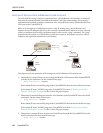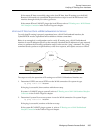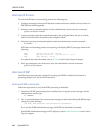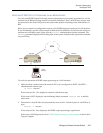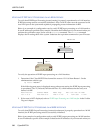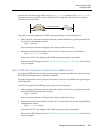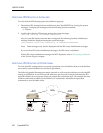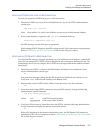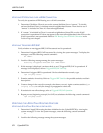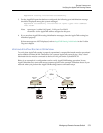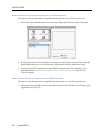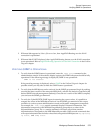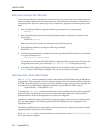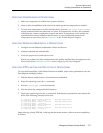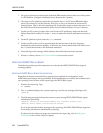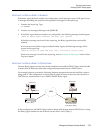
USER’S GUIDE
372 CyberSWITCH
VERIFYING IPX ROUTING OVER A WAN CONNECTION
To verify the operation of IPX Routing over a WAN connection:
1. Determine if NetWare Client A can see the remote NetWare Server “remote.” To do this,
activate NetWare Client A’s desktop network neighborhood feature. Then check to see if
“remote” is included in Client A’s network neighborhood.
2. If “remote” is included in Client A’s network neighborhood, them IPX over the WAN
connection is operational. If it does not appear in the network neighborhood, then IPX over the
WAN connection is not operational. Refer to IPX Routing Over the WAN Connection in the
Problem Diagnosis chapter.
VERIFYING TRIGGERED RIP/SAP
Verify whether or not triggered RIP/SAP has started and is operational:
1. Determine if triggered RIP/SAP has started by viewing the system messages. To display the
messages, enter the following console command:
dr <RET>
2. Look for following message among the system messages:
Starting Triggered RIP/SAP for <WAN Peer>
3. If this message is displayed, continue check to see if Triggered RIP/SAP is operational. If
message is not displayed, refer to Triggered RIP/SAP Start Up.
4. Determine if triggered RIP is operational. On the administration console, type:
ipx trigrip stats
5. Examine statistics for activity. Refer to Triggered RIP Statistics for possible statistics and their
descriptions.
6. Create a change in the route (for example, shut down a server). Again examine statistics (
ipx
trigrip stats)
to verify the change is propagated to other side.
7. If statistics do not reflect change, refer to Triggered RIP/SAP Operation.
8. Repeat process (beginning at step 4) for SAP, but substitute the following console command:
ipx trigsap stats
VERIFYING THE APPLETALK ROUTING FEATURE
VERIFYING APPLETALK ROUTING IS INITIALIZED
1. Determine if AppleTalk routing has been initialized on the CyberSWITCH by viewing the
system messages. To view the system messages, enter the following console command:
dr
2. Look for the following message among the system messages:



